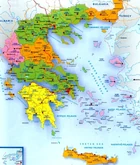Browse All Greek Recipes: Greek Appetizers | Greek Beverages | Greek Soups | Greek Salads | Greek Vegetarian | Greek Meat Dishes | Greek Snacks | Greek Desserts

Greece

|
This article is a stub! This article doesn't contain enough information. If you know anything about Greek Cuisine, please add to this article!
|
Greece - Cooking and Food[]
Overview of Greek Cuisine History[]
It is well known that Greek Cuisine rules the cuisines from the entire world, so it is no surprise to find out that the first cookery book was written in 330 B.C by the Greek food gourmet, Archestratos. While other countries have a cuisine strongly influenced by different cultures, Greek cuisine seems to exist since 350 B.C, when Alexander the Great extended the Greek empire.
Due to its history and geography, the Greek style of cooking is typical of Mediterranean cuisine, having also influences from Italy, the Balkans, and Middle East. Even though Wheat is the main grain is this country, Barley is also grown here. The most important vegetables which grow in Greece are potatoes, green beans, tomatoes, Eggplant, onions, and okra. Here the terrain generally favours the production of goats and sheep over cattle, and this is the reason why Beef dishes tend to be a rarity by comparison. In coastal regions and on the islands, fish dishes are very popular. Greek food has always a special taste and this is given by the regional produced olive oil. The hearty spirit of the Greek cuisine does not agree with too much refinement. According to their tradition, the Greeks prefer to serve their dishes warm rather than hot. In Greece, the traditional meat of festivals and holidays is Lamb, but Beef, Pork, or poultry are considered to be very delicious, as well.
Cuisines of Greece[]

Map of Greece - Click to enlarge
Nowadays, because of the many invasions which took place throughout history, Greek dishes have Turkish names such as Baklava, Moussaka while in the western part of the country, a lot of food names have a distinctive Italian flavour, like pastitsada. Nevertheless, the history of Greece cannot be forgotten as long as Greeks have always given a great importance to the preparation an appreciation of fresh food, as a symbol of respect and friendship. Greece has a warm and dry climate which offers real good growing conditions for olive and lemon trees and this aspect is essential as lemons and olive oil represent an important part of the Greek diet. oregano, garlic, basil, thyme, courgettes and aubergines are widely used, as well, while honey is the main ingredient in flavouring desserts like Theepless and Baklava. Another specialty ingredient in Greek cuisine is feta cheese.
Preparation Methods for Greek Cooking[]
Because of the intimidating Greek language, the way in which dishes are prepared seems to be extremely complex. Despite this, Greek foods are prepared using basic cooking methods and in most of the cases the name of the dish tells how it is prepared.
Greek foods are never smoked in home cooking and they can be fried, boiled, stewed, baked, roasted, simmered, grilled, pickled, sautéed, pureed, preserved, or poached. They have names like: Kapama, which is stovetop meat or poultry casserole in a spicy and sweet tomato sauce; Kokkinisto, stovetop meat or poultry casserole in a tomato sauce; Ladera which consists of stovetop vegetable or rice casseroles cooked with olive oil; Ogkraten, a Greek version of “au gratin” baked with a béchamel sauce and sprinkled cheese; Pane which is fried after dipping in egg, flour, and crumbs; Stifatho, stewed with lots of pearl onions, and Sto fourno, which is baked and it literally means “in the oven”.
Special Equipment for Greek Cooking[]
People in Greece are strongly tied to their birthplace and they feel a tremendous love for it. It does not matter the region the recipes come from as long as they are consumed fresh, and picked fresh in season. Greek food is really healthy as most of the meals here contain plant protein. Even children get involved in Greek cuisine, by helping women gather herbs, wild greens, knead and bake bread, make cheese, or prepare meals. Most Greek dishes don’t require you to purchase any special tools. However, having a coffee grinder helps with roasting and grinding spices and maximizes their volatile oils, which, in turn, provides your food with more flavor.
Greek Food Traditions and Festivals[]
The Greek cuisine has been influenced by lots of culinary traditions, beginning with Alexander the Great and continuing with King Constantine and the Turkish invasion. As a result of these influences, Greek cuisine has a lot in common with other cultures, such as the Italian, the Balkan, or Middle East cultures.
Easter is considered to be the most important festival in Greece. Nevertheless, religious festivals and seasons are also of a great importance. In cooking Easter meal, people use fresh creamy cheese in order to make sweets, then tiny succulent spit-roasted Lamb or kid and wild greens salad, tiny raw artichokes, Fresh Beans, as traditional dishes. However, the main meal served during festival seasons is roasted Lamb. As for Pork and Beef, they are marinated, grilled and baked, and Chicken is braised or broiled. These meals are more delicious if they are served with golden lemon sauce or cinnamon-spiced tomato sauce.
People in Greek Food[]
- Are you into Greek Cooking and would like to be interviewed?
In Greece people are seriously interested in foods and even in their meetings their discussion is centered on food. The truth is that hospitality is an essential feature which characterizes the Greeks. People here are strongly tied to their birthplace and they feel a tremendous love for it. It does not matter the region the recipes come from as long as they are consumed fresh, and picked fresh in season. Greek food is really healthy as most of the meals here contain plant protein. Even children get involved in Greek cuisine, by helping women gather herbs, wild greens, knead and bake bread, make cheese, or prepare meals.
Furthermore, the Greeks give attention to the details of growing, gathering or preparing the food. For them, discussing about food is as important as eating that meal, so that is why they eat with passion and then discuss passionately about the food. So, it is not a secret that in Greece you will often hear people talking about the preparation of their foods, about freshness or flavours, or even about who brought that food, who bought it and so on.
More about Greek Culture[]
Other Regional Links:
